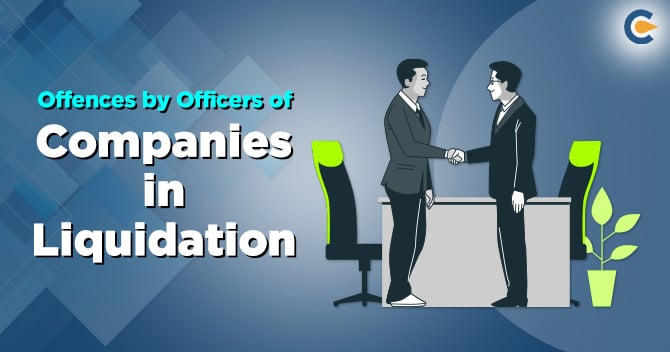Under Companies Act, 2013, Companies go for Liquidation, when the business of Company comes to an end, and the assets of the Company are distributed among the persons having a claim over the Company. In Liquidation, the property of the Company is administered for the benefit of creditors and members of the Company. Certain Officers are appointed by the Company Liquidator to manage and administer the Liquidation process of the Companies.
The Officers of Companies in Liquidation are entitled to provide true facts and information to the Company Liquidator or to any other authorities about the Company. The Officers if does not follow the prescribed rules, and Offences by Officers of Companies in Liquidation are committed, then the Officers are entitled to Punishment under Section 336 of the Companies Act, 2013. In this article, we will discuss the different Offences by Officers of Companies in Liquidation.
What is Liquidation?
Liquidation is defined as a process of bringing the business of the Company to an end. The assets of the Company in Liquidation are distributed among the person having a claim on the Company. When a Company has no realistic prospect of a going concern or the Company is insolvent then as a consequence Liquidation occurs in the Company.


The Liquidation can be of two types: Compulsory or Voluntary. The Compulsory Liquidation occurs when the Company is unable to pay the dues. The Compulsory Liquidation is generally forced by the creditors of the Company. Voluntary Liquidation occurs when the Company has no realistic prospects to remain going concerned. The entity itself forces the Voluntary Liquidation through its Board of Directors.
For the process of Liquidation to be speedy and efficient, a Company Liquidator is appointed. The Company Liquidator appoints certain Officers under him to administer and complete the process of Liquidation in the Company.
The appointed Officers of Company in Liquidation, should not do any act to conceal and falsify the true facts and information related to the Company and no Offences by Officers of Companies in Liquidation should be committed by them as well. The Offences by Officers of Companies in Liquidation are punishable under the Companies Act, 2013[1]. Section 336 of the Companies Act, 2013, provides for the Offences by Officers of Companies in Liquidation. The provisions for punishments for the Offences by Officers of Companies in Liquidation is also provided under Section 336 of the Companies Act, 2013.
What are the different Offences by Officers of Companies in Liquidation?
The Company when goes for Liquidation either Voluntarily or by Tribunal or is subsequently ordered by Tribunal to be wound up or passes a resolution for wound up, the Offences by Officers of Companies in Liquidation are punishable under the Companies Act, 2013. The Offences by Officers of Companies in Liquidation are provided under Section 336 of the Companies Act, 2013. The different Offences by Officers of Companies in Liquidation are as follows:


Non-Disclosure of Property of Company
- The Officer of Company in Liquidation, in his best belief and knowledge, does not truly and fully do the disclosure of the property, movable or immovable, of the Company, to the Company Liquidator.
- The Officer of Company in Liquidation does not disclose how and to whom Company disclosed property of Company, and for what consideration property was disposed of to person. The Officer is also entitled to disclose that when the property of the Company was disposed of. The property of Company does not include that property which was disposed of in the ordinary course of business of Company.
No Delivery of Property of Company
- The Officer of Company in Liquidation does not deliver the property of the Company to the Company Liquidator. The property includes such property which was in custody and control of Officer, and the Officer is required to deliver the property by law. Sometimes, the Company Liquidator can also direct the Company Liquidator to deliver the property to him.
No Delivery of Books and Papers of Company
- The Officer of Company in Liquidation does not deliver the books and papers of the Company to the Company Liquidator. The books and papers of the Company should be custody and control of the Officer and which the law requires the Officer to deliver it to the Company Liquidator. The Company Liquidator can also direct the Officer to deliver the books and papers to him.
Concealment and Falsification of Property or Affairs of Company
The Officer of Company in Liquidation, within 12 months immediately before the commencement of the winding-up or any time after that:
- Do concealment of any part of the property of Company to the value of 1000 Rupees or more,
- Do concealment of any debt due from or to the Company,
- Do fraudulent removal of any part of the property of the Company of the value of 1000 Rupees or more,
- Do destruction, concealment, falsification or mutilation of any books or papers of the property of the Company. The books and papers should be related to the property or affairs of the Company and should affect the property or affairs of the Company.
- Do concealment, falsification, mutilation and destruction as a privy of any books or papers of the property of the Company. The books and papers should be related to the property or affairs of the Company and should affect the property and affairs of the Company.
- Do alteration or makes any omission, or fraudulently parts with, any books and papers of the Company. The books and papers should be related to the property and affairs of the Company and should affect the property and affairs of the Company.
- Do alteration, omissions, or fraudulently parts with as privy to any books and papers of the Company. The books and papers should be related to the property and affairs of the Company and should affect the property and affairs of the Company.
- Obtains or credits any property on or on behalf of the Company by false representation or by other fraud. The property obtained or credited by the Officer is not for Company, and the Company does not pay for the property.
- Obtains or credits any property for or on behalf of Company by falsely pretending that Company is carrying on business. The Company does not pay for the property.
- Do pledging, pawning or disposition of any property of Company which is obtained on credit and has not been paid for by Company. If the pledging, pawning or disposition id sone in the ordinary course of business of the Company, then it is considered as an offence.
Material Omission in Statements of Company
- The Officer of Company in Liquidation, do any material omission in the statements of the Company. The statements in which the omission is made should be related to the affairs of the Company.
False Debt not Informed of Company
- The Officer of Company in Liquidation does not inform the Company Liquidator of any False debt proved by a person under winding up of the Company. The Officer knowingly and believingly of the False Debt does not inform the Company Liquidator for the 1-month period.
Prevents Production of Books, Papers and Accounts of Company
- After commencement of winding up of Company, Officer of Company in Liquidation prevents the production of any books and papers of Company. The books and papers should be related to the property and affairs of the Company and should affect the property and affairs of the Company.
- After commencement of winding up of Company, or in any meeting of creditors, Officer of Company in Liquidation attempts to account for part of property with fictitious loses or expenses.
False Representation or Fraud to Creditors of Company
- To obtain any consent of creditors of Company, the Officer of Company in Liquidation does false representation or fraud to an agreement. The agreement should be related to the affairs of the Company or the winding-up of the Company.
Read our article:Commencement of Winding Up of a Company by Tribunal under Companies Act 2013
What is the Punishment for the Offences by Officers of Companies in Liquidation?
Under the Companies Act 2013, the Punishment for the Offences by Officers of Companies in Liquidation is provided under Section 336 of the Act. The Punishment for the Offences by Officers of Companies in Liquidation is as follows:


- The Officer of Company in Liquidation shall be punished with imprisonment which should not be less than 3 years and which can be extended to 5 years, and
- The Officer of Company in Liquidation shall be punished with a fine which should be less than 1 lakh Rupees and which can be extended 3 lakh Rupees.
What is the Punishment to the person who receives the property of the Company?
Under the Companies Act, 2013, if any person who receives any property which is pawned, pledged or disposed of by the officers of Companies which amount to an offence, then such person should be given Punishment according to the rules prescribed under the Section 336(2) of the Act. The Punishment to the person receiving property from the Officers of Companies who committed an offence is as follows:
- The person should be punished with imprisonment which should not be less than 3 years and can be extended to 5 years, and
- The person should be punished with a fine should not be 3 lakh Rupees and can be extended to 5 lakh Rupees.
Conclusion
The Companies Act, 2013, provides for the Liquidation of Company in case the Company fails to carry on its business. The Company Liquidator appoint certain officers for the completion of the process of Liquidation of the Company. The Officers of Companies in Liquidation should abide by the directions of the Company Liquidator and should work according to the prescribed rules. If the Officers of Companies in Liquidation does not follow the prescribed rules and commit an offence will be punished under the Companies Act, 2013. The Offences by Officers of Companies in Liquidation are mentioned under Section 336 of the Companies Act, 2013. The Punishment for Offences by Officers of Companies in Liquidation is provided under Section 336 of Companies Act, 2013, and the Officers are strictly punishable for any offence they commit.
Read our article: Powers and Duties of Liquidator in Voluntary Winding Up A Complete Checklist











